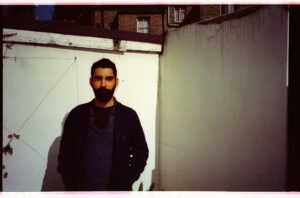The revolutionary period of Palestinian cinema began in 1968 with the founding of the Palestine Film Unit (PFU), dedicated not only to providing visual representation of and political education about the struggle for Palestinian liberation, but to asserting the right of Palestinians to be the subjects of their own representation. The PFU filmmakers did not see themselves as objectively documenting the liberation movement, but as active participants in the resistance. Part of a movement of Third Cinema that challenged both the Hollywood commercial studio system, and the European “Auteur” theory of the individual genius, the filmmakers of the PFU and the solidarity network they developed were dedicated to militant cinema as a social process of witnessing, participating in, promoting, screening, and critiquing the Palestinian liberation movement in all its forms. In one act in a long history of cultural genocide, the Israeli military stole the PFU archive when they withdrew from Beirut in 1982, but since then much of the archive has been reconstituted from distributed copies, remnants, restorations, and remixes.
In 2003, PFU co-founder Mustafa Abu Ali saw his film They Do Not Exist projected in Palestine for the first time in 20 years and remarked “We used to say ‘Art for the Struggle’, now it’s ‘Struggle for the Art’”. This selection of films presents the creative fury of this period of revolutionary cinema, from the original PFU filmmakers to the international cinematic solidarity network they helped build. This programme presents us with a vision of Palestinian resistance that is unapologetic, beautiful, subversive, and inspiring; a crucial reminder of the kind of cinema we should continue to make – and watch – during this genocide and beyond.
Far Away From Home (dir. Qais Al-Zubaidi, 1969, 11min) A beautiful and moving experiment in which Al-Zubaidi invited the children he had just filmed in Al-Sabineh Palestinian refugee camp in Syria to narrate their own footage. The result is a disarming and reorienting experience that says as much about the construction of media perception as it does about the children themselves.
The Game (dir. Shirak, 1973, 16min) – A short fiction film – a rarity in the era of revolutionary cinema – that lays painfully bare the cycle of violence children are subjected to, and the inevitable consequences of that violence. The fatalism of The Game is a disturbing counter-point to the casual innocence of Qais Al-Zubaidi’s Far Away From Home, also part of this programme.
Cowboy (dir. Sami Al-Salamoni, 1973, 15min) – An experimental montage of archive and re-appropriated Hollywood footage that creates links between the treatment of Native Americans, the dispossession of the Palestinians, and the representations of these and other genocides in cinema history.
Quneitra 74 (dir. Mohammad Malas, 1974, 20min) A peripatetic docu-fiction on displacement, reconstruction, and the fallibility of memory that returns to the Golan Heights village of Quneitra with its inhabitants after it was destroyed by the Israeli military. Never one to simply indulge in the aesthetics of ruins, Mohammad Malas’ protagonist looks us, the audience, in the eyes as if to remind the world outside of its complicity.
Children Without Childhood (dir. Khadijeh Habashneh, 1972, 21min) Co-produced by the General Union of Palestinian Woman, this film from one of Palestinian cinema’s chief archivists reflects both the suffering and endurance of the orphans of Bayt Al-Sumud (The House of Steadfastness). Starkly revealing of the endless contradictions between international law and the reality of Palestine, Habashneh’s landmark work is an infuriating reminder that Israel’s physical violence and cultural genocide has changed little in over 50 years since this film was made.
The screening will be followed by a discussion with Professor Anandi Ramamurthy on the enduring legacy of the work of the PFU, and the work of artists and archivists to preserve and reconstitute the archive.
Professor Anandi Ramamurthy is Emeritus Professor in Media and Culture at Sheffield Hallam University. Her research is focused on ‘race’ and racism in media and culture. She led a research project into Palestinian cinema and is a member of a creative coalition to restore and exhibit Palestinian films from the 1970s.
About the curator

Saeed Taji Farouky is a Palestinian-British filmmaker and artist who has been making films around themes of conflict, human rights and colonialism since 1998. He is also a radical educator and runs Radical Film School, a free programme for filmmakers from underrepresented backgrounds to develop political cinema and autonomous exhibition collectives.
